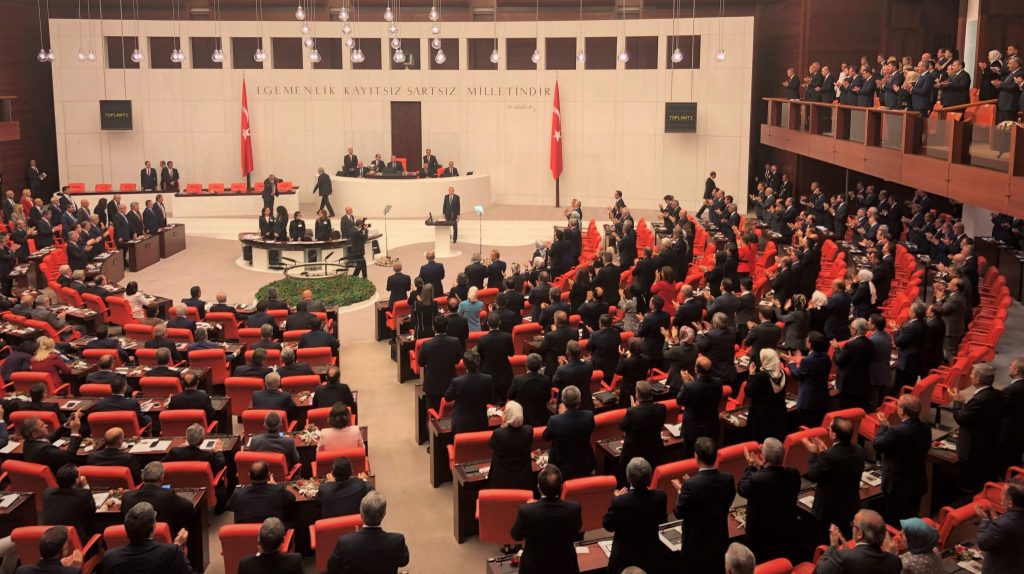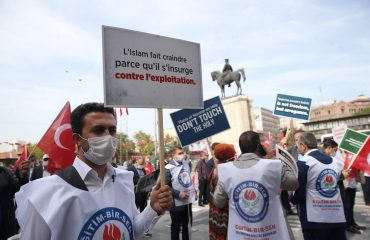

Some observations in the corridors of the parliament, and a small interview with the deputies are sufficient to say that both the opposition and ruling side are in pursuit of a way in pain and new developments are on the corner.
You see a deputy score their own goal every minute. Two of these scores are noteworthy. One of them was ruling Justice and Development Party (AKP) lawmaker Mahir Ünal’s comment on Türkiye’s early 20th-century shift to the Latin alphabet from the Arabic alphabet. As he criticised the shift, arguing that Turkish people have lost their culture, the strongest reaction came from the AKP’s alliance partner, Nationalist Movement Party (MHP) leader Devlet Bahçeli, to whom President Tayyip Erdoğan owes his power. It was AKP Spokesperson Ömer Çelik’s turn to clean the mess: “The Turkish Republic will remain forever,” he said.
The second score was from the opposition front. CHP lawmaker Sezgin Tanrıkulu announced that he will convey the allegations that the Turkish military used chemical weapons against the outlawed Kurdistan Worker’s Party (PKK) to the Parliament’s attention. CHP’s alliance partner İYİ Party’s spokesperson Kürşad Oğuz accused Tanrıkulu of being “irresponsible”. This time the duty of cleaning this mess was of CHP Spokesperson Faik Öztrak’s. “It was wrong of him to make a public statement on a sensible and exploitable issue,” he said.
It will suffice to state that the allegation was not mentioned at all, even at the Kurdish-issue-focused People’s Democracy Party (HDP) Parliamentary Group meeting on October 25.
The pursuit of the HDP
HDP co-chair Mithat Sancar devoted his speech to political issues entirely on the presidential election.
He also gave the media a headline suggestion, just in case something else comes to the fore: The HDP had decided to nominate its presidential candidate, and the search for a name had begun.
HDP’s move means new calculations about the first and second-round strategies of the 2023 presidential election. Things are getting more complicated on both the ruling and opposition fronts.
Also, until now, HDP politicians had been saying how they could vote for a presidential candidate who would be nominated out of the six opposition parties’ alliance front. The HDP’s Ahmet Türk then told journalist İsmail Saymaz that if CHP leader Kemal Kılıçdarolu were the candidate, the party would consider voting for him. Saymaz said Türk’s words on October 22 evening at TV program, it was a headline on October 23.
The HDP’s decision to nominate its own candidate was taken, however, at the party’s board meeting on October 24. Sancar said that they would also ask the opinion of the Labor and Freedom Alliance, which is newly formed with the left parties, in determining the HDP’s candidate; it means they haven’t asked them yet.
When I say in pursuit, I mean these developments.
Internal problems in the CHP
There are multiple sources of internal troubles in the CHP.
I will not count Kılıçdaroğlu’s recent message to his party members asking “Are you with me?” It happens at every party at times like this. Meral Akşener’s taking the IYI Party to a Congress before the election is a similar preliminary step.
One of the sources of the inner turmoil is Kılıçdaroğlu’s move for the enactment of the headscarf law. After Erdoğan responded to Kılıçdaroğlu’s proposition by asking the opposition to join for a constitutional amendment, it is doubtful how much the party officials, who boasted about the headscarf law by saying “we scored a goal against Erdogan” convinced the base with the same statement.
In the same way, it is difficult to say that Kılıçdaroğlu was able to convince the CHP organisation about his trip to the USA by saying “it was to see scientific developments on the spot” despite serious objections from the party boards.
When you talk with deputies a little, the concern of not being able to find a place in the party lists for the upcoming parliamentary elections stands out within the organisation and the parliamentary group, as is the question of “What’s next?”. Because the concerns of some names within the six-party-opposition alliance who rely on either the CHP or IYI Party lists to be able to enter the parliament in the 2023 elections are reflected on backstage. This causes a certain tension in both the IYI Party and the CHP base, leading a pursuit of a way.
The AKP wants to have it all
Political scientist Ali Çarkoğlu wrote in YetkinReport on October 25 that “The electorate does not only look at the economy”; “It also looks at the future prospects.”
Undoubtedly, this statement is also beneficial for the CHP and IYI Party. President Erdogan, on the other hand, follows a strategy that consists only of future prospects. In pursuit of connecting the upper and upper-middle income groups to his political future with the Currency Protected Deposit Account project, Erdoğan aimed to tie the lower-middle income group for two years with the TOKİ project. The “Century of Turkey” project, which stemmed from former president Turgut Özal’s statement “the 21st Century will be the Century of the Turks,” is proof of this.
However, Erdoğan could not decide where to position the AKP in these elections. The fact that the six-party opposition alliance hasn’t announced its nominee plays a part in this. It was also seen in Erdogan’s last Diyarbakir rally that the Kurdish voters would not favour the AKP -especially in partnership with the MHP- as much as before.
Will it be a more religious and conservative copy of Turgut Özal’s 1980’s and 1990’s liberal Motherland Party (ANAP) line, as suggested by the new propagandist Ertan Aydın; will it be a discourse that will keep the political Islamist segment, whose voice is louder than its size, in the pocket; or will it be a combination of both?
Three-children condition might be lifted
Mahir Ünal’s statement about the Arabic alphabet and Turkish is an example of that pursuit and internal troubles. Another example is AKP’s three-child requirement to provide housing support to widowed women. There was a reaction not only from İYİ leader Akşener, MHP, and even BBP leader Mustafa Destici, but also from the AKP women’s branch.
Write it down please; that condition will change.
Politics sometimes requires us to look at what is not said rather than what is said.
You would be wrong if you think that all AKP women were enchanted when President Erdoğan forgot about the open microphone and said “a woman’s career is to have children” when he recruited ex-CHP Deputy Mehmet Ali Çelebi to the AKP. The AKP also has a large number of urban, educated, business-savvy, and powerful women.
Besides, wasn’t one of the most important reasons for opposing the headscarf/turban bans, one of the factors that brought the AKP to power, to prevent veiled women from having a job, business or career? Now, what does KADEM, of which Sümeyye Erdoğan Bayraktar is one of the managers, say that childbearing is considered a career?

